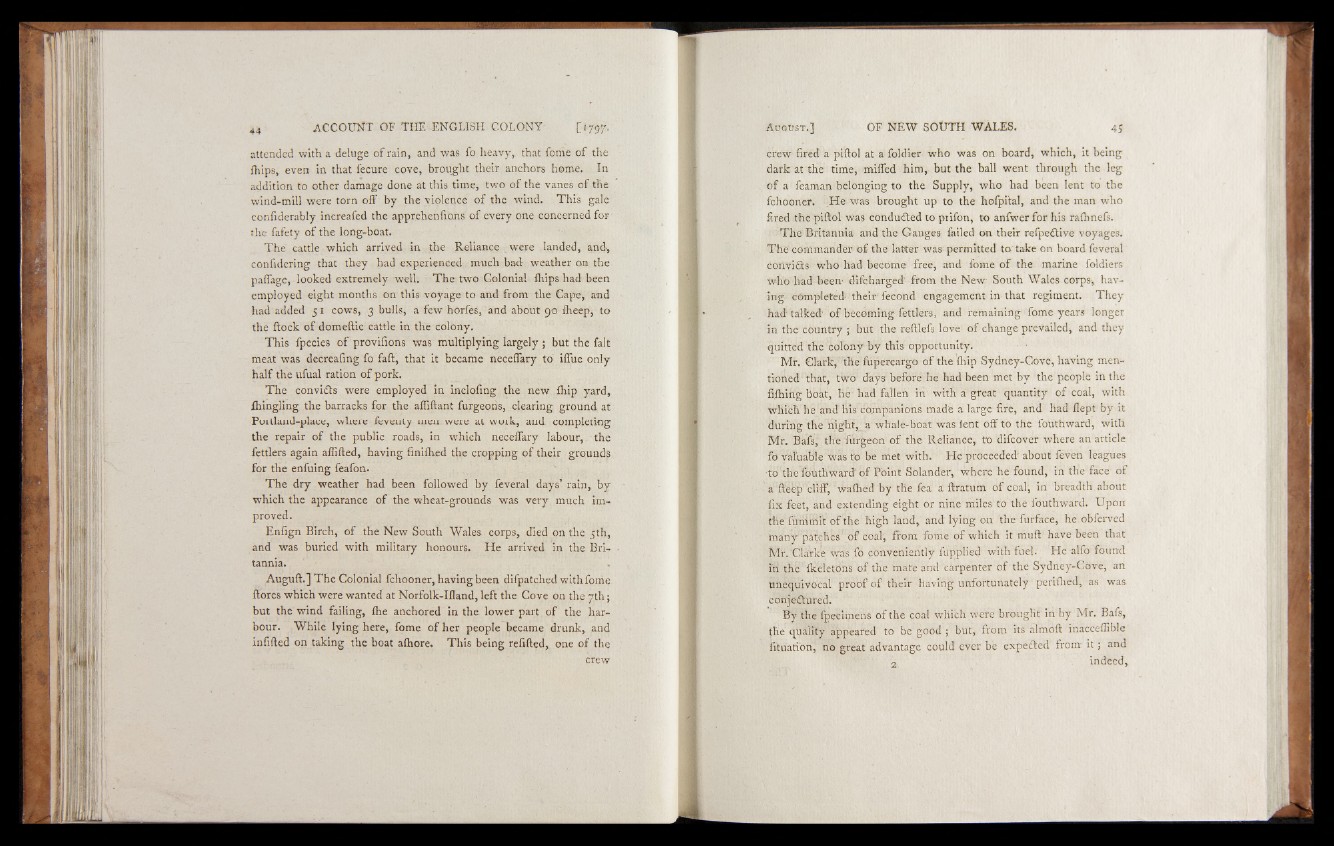
C ‘797-
attended with a deluge of rain, and was fo heavy, that feme of the
fhips, even in that fecure cove, brought their anchors home. In
addition to other damage done at this time, two o f the vanes o f the
wind-mill were torn off by the violence o f the wind. This gale
confiderably increafed the apprehenfio.ns of every one concerned fo r '
the fafety of the long-boat.
The cattle which arrived in the Reliance were landed, and,
confulering that they had experienced much bad weather on the
paffage, looked extremely well. The two Colonial fhips had been
employed eight months on this voyage to and from the Cape, and
had added 5 x cows, 3 bulls, a few horfes, and about 90 Iheep, to
the ftock o f domeftic cattle in the colony.
This fpecies o f provifions was multiplying largely ; but the fait
meat was decreafing fo faff, that it became neceffary to iffue only
half the ufual ration o f pork.
The convicts were employed in inclofing the new fhip yard,
fhingling the barracks for the affiftant furgeons, clearing ground at
Portland-place, where feventy men were at work, and completing
the repair of the public roads, in which neceffary labour, the
fettlers again aflifted, having finifhed the cropping o f their grounds
for the enfuing feafon.
The dry weather had been followed by feveral days’ rain, by
which the appearance o f the wheat-grounds was very much improved.
Enfign Birch, o f the New South Wales corps, died on the 5th,
and was buried with military honours. He arrived in the Britannia.
.
Auguft.] The Colonial fchooner, having been difpatched withforrie
ffores which were wanted at Norfolk-Ifland, left the Cove on the 7th;
but the wind failing, fhe anchored in the lower part of the harbour.
While lying here, fome o f her people became drunk, and
infilled on taking the boat alhore. This being refilled, one of the
crew
crew fired a piftol at a foldier who was on board, which, it being
dark at the time, miffed him, but the ball went through the leg
o f a feaman belonging to the Supply, who had been lent to the
fchooner. .He was brought up to the hofpital, and the man who
fired the piftol was conducted to piifon, to anfwerfor his ralhnefs.
The Britannia and the Ganges failed on their refpeCtive voyages.
The commander of the latter was; permitted to'take on board feveral
convicts who had become free, and fome of the marine foldiers
who had been- difcharged’ from the New- South Wales corps, having
completed' their fecond engagement in that regiment. They
had-talked' of becoming-fettlers, and remaining- fome years longer
in the country ; but the reftlefs love o f change prevailed, and they
quitted the colony by this opportunity.
Mr. Clark, the fupercargo of the fhip Sydney-Cove, having mentioned
that, two days before he had been met by the people in the
filhing boat, he had fallen in with a great quantity of coal, with
which he and his'companions made a large fire, and had flept by it
during the night, a whale-boat was fent off to the fouthward, with
Mr. Bafs, the furgeon of the Reliance, to difcover where an article
fo valuable was to be met with. He proceeded' about feven leagues
to the fouthward'of Point Solander, where he found, in the face of
a ftebp cliff, -walhed by the lea a ftratum o f coal, in breadth about
fix feet, and extending eight or nine miles to the fouthward. Upon
the fummit of the high land,' and lying on the furface, he obferved
many patches' of coal; from fome of which it muft have been that
Mr. Clark'e was fo conveniently fupplied with fuel. He alfo found
iri the fkeletons of the mate and carpenter of the Sydney-Cove, an
unequivocal proof of their having unfortunately perilhed, as was
conjeClured.
By the fpecimens of the coal which were brought in by Mr. Bafs,
the quality appeared to be good ; but, from its almoft inacceffible
fituation, no great advantage could ever be expected from i t ; and
2 indeed,